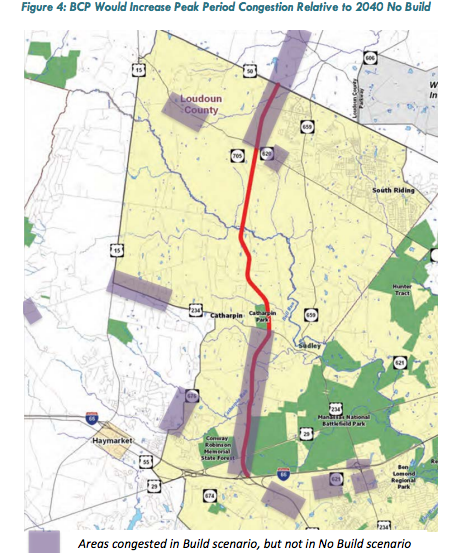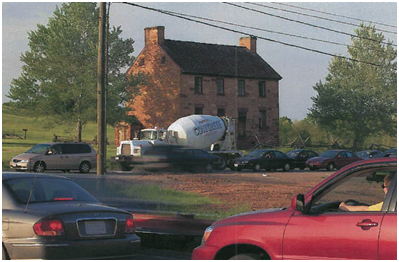With Terry McAuliffe about to move in to the Virginia governor's mansion, it’s unclear what will become of one of the state’s most contested transportation proposals -- the Bi-County Parkway, a $440 million highway in the outer D.C. suburbs.

Though it seems likely the current administration of Republican Governor Bob McDonnell will make a forceful push to get approvals sealed before the end of the year, the timeline is tight. Then there’s the big question of how McAuliffe, a Democrat, will manage the controversial proposal.
As planned, the four-lane divided highway would run 10.4 miles north-south between Route 50 and Route 66, two notoriously clogged commuter roads into D.C.
Critics of the Bi-County Parkway -- who have been varied and outspoken -- warn that the new highway would do little to ease congestion, and would in fact create even more traffic in this mixed region of farmland, cul-de-sacs, and Civil War landmarks. Smart growth advocates see the developers salivating over the project and predict that the road will simply perpetuate the trend of isolating housing from jobs.
“From what we see, all it’s going to encourage is more residential development in an area that lacks sufficient infrastructure,” said Stewart Schwartz, executive director of the Coalition for Smarter Growth. "It’s putting more cars on top of the funnel."
The proposal is at a critical juncture now, with the Virginia Department of Transportation (VDOT) aiming to submit a final environmental impact statement to the feds by the end of the year -- before McDonnell leaves.
McDonnell has aggressively pushed the Bi-County Parkway, even going so far as to hire a public relations firm to pitch the project.
“He has fast-tracked the planning and approvals and all that,” said James Bacon of Bacon’s Rebellion, a Virginia public policy blog. “He clearly made it a priority.”
And though several aspects of the project are still tied up in negotiation -- particularly due to the government shutdown -- many believe McDonnell will make an all-out effort to get Federal Highway Administration sign-off before 2014.
“The McDonnell Administration is flooring the gas pedal... hoping to get final approval before their time runs out,” wrote Morgan Butler, an attorney for the Southern Environmental Law Center, in an email. “The administration has downplayed (or ignored outright) major community and environmental impacts and given short shrift to alternatives, as they try to get their pet projects to a point of no return before they leave office.”
A study published by SELC and other smart growth and environmental groups this summer, “Rethinking the Bi-County Parkway,” argues that the project won’t help the region’s biggest transportation problem -- east-west travel -- and will undermine preservation goals for Manassas National Battlefield Park. Instead of the highway, the report recommends transit improvements like extensions for Metro and VRE and an express bus on Route 50. VDOT has not formally analyzed any of those other options.

Critics of the Bi-County Parkway have also worried the project will help resurrect old plans for other roads, like a 45-mile "north-south corridor of significance," and even a larger "Outer Beltway," which VDOT has denied.
VDOT's pitch is that the new highway will ease congestion by increasing connectivity between Loudon and Prince William counties and replacing a route through the battlefield park. Supporters have also said the highway will spur more air cargo activity at Dulles Airport, though a researcher at George Mason University disputed that claim.
So far there’s no definitive indication of how the next administration will deal with the Bi-County Parkway. When the topic came up during election debates, McAuliffe avoided taking a firm stand, saying he needed more facts. McAuliffe’s Republican opponent, Ken Cuccinelli, was more forthright in opposing the proposal, though he expressed support for some type of north-south connector.
For some voters, the issue was enough to bring them over to the “Democrats for Cuccinelli” camp, said Charlie Grymes, chair of the Prince William Conservation Alliance. Even more interesting, he said, was the way it forced some Virginia delegates to mark their positions. Bacon’s Rebellion also noted the unusual camaraderie the issue forged between populist conservatives and liberal smart-growth advocates.
While Cuccinelli’s stance stemmed from his fiscal conservatism, McAuliffe has made it clear that he intends to pour big bucks into transportation. As Politico notes, his campaign played up his support for Virginia’s new law to raise $1.4 billion for infrastructure through increased sales taxes and other fees.
To Bacon, that may make McAuliffe more inclined to support wasteful projects like the Bi-County Parkway.
But The Washington Post also notes that McAuliffe’s platform highlighted “elements that appeal to advocates of livable, walkable communities.”
Schwartz sees the new administration as a fresh opportunity to examine alternatives. With McAuliffe “walking into a transportation agency which enjoys significantly higher levels of funding,” he said, it’s going to be “incumbent to look at how we can spend funds more wisely.”
Also critical will be McAuliffe’s decisions about transportation leadership. Many view the Bi-County Parkway as a pet project of Sean Connaughton, the current transportation secretary.
“Once he’s gone, the project’s going to lose a big backer,” said Bacon. “On the other hand, the political constellation around it won’t disappear.”





